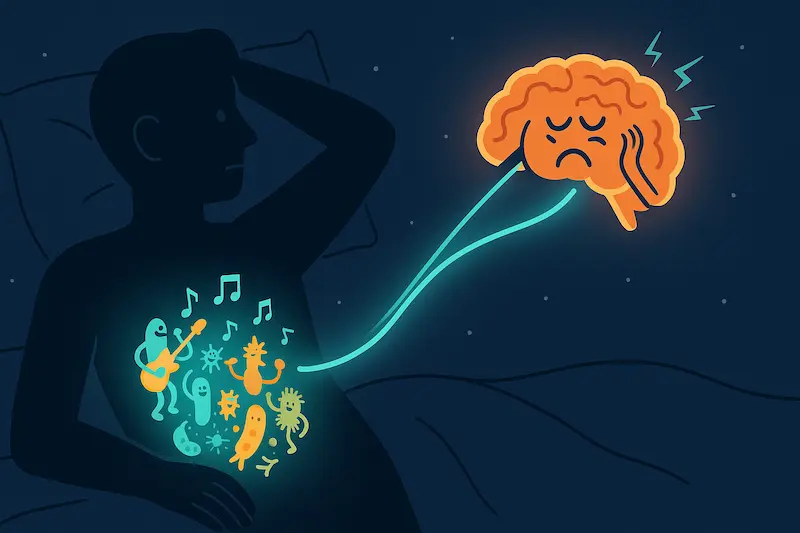😴 Why Your Gut Might Be Keeping You Awake
Insomnia isn’t always just about stress, too much caffeine, or staring at your phone at 1 AM (though, yes, those matter). Emerging research points to something deeper — your gut microbiome. That’s the community of trillions of bacteria living in your digestive system, and it turns out they have a lot to say about your sleep.
Scientists are uncovering strong links between gut health and sleep quality. When your gut bacteria are out of balance (aka dysbiosis), it can affect your brain chemistry, your stress hormones, and even your body clock.
🦠 The Bacteria-Sleep Connection: What We Know
So, is there a single “insomnia bacteria”? Not exactly. But certain patterns keep showing up:
- Low microbial diversity = poor sleep.
Studies have found that people with fewer types of gut bacteria tend to have shorter sleep and more frequent wake-ups. - Firmicutes and Bacteroidetes ratio.
Some research suggests that an imbalance between these two major bacterial groups correlates with sleep disturbances. - Lactobacillus & Bifidobacterium (the “friendly” bacteria).
Higher levels are linked to better sleep quality. These bacteria help produce GABA, a calming neurotransmitter that promotes relaxation. - Alistipes (the suspicious character).
Elevated levels of Alistipes have been associated with depression, stress, and poor sleep in some studies. - Ruminococcus & Blautia.
Disruptions in these bacteria have been tied to insomnia-like symptoms, although the research is still early.
🧪 How Gut Bacteria Affect Sleep Chemistry
Gut microbes influence sleep through several pathways:
- Neurotransmitters: Many bacteria produce or influence neurotransmitters like serotonin, dopamine, and GABA — all of which affect sleep.
- Melatonin: About 90% of serotonin (a melatonin precursor) is produced in the gut. If the gut is off, melatonin production can be too.
- Inflammation: Dysbiosis can increase systemic inflammation, which is linked to sleep disruption.
- Stress response: Gut microbes affect the HPA axis (stress hormone system), meaning an unbalanced gut can keep you in “fight or flight” mode instead of “time to snooze.”
🚫 Quick Reality Check
There’s no single villain microbe you can blame for tossing and turning at 3 AM. Insomnia is complex, and while gut bacteria play a role, they’re just one piece of the puzzle. Other factors — stress, diet, medical conditions, hormones, and lifestyle — all matter.
📝 Key Takeaways
- Gut bacteria and insomnia are closely linked, but there’s no one “insomnia bug.”
- A healthy balance (with more beneficial microbes like Lactobacillus and Bifidobacterium) supports better sleep.
- Imbalances involving bacteria like Alistipes or Ruminococcus may be tied to poor sleep.
- The gut-brain axis (via neurotransmitters, melatonin, inflammation, and stress hormones) is the bridge between your belly and your brain.
👉 Want to dig deeper? Check out our other articles on brain fog and digestion and gut health symptoms.
⚠️ Disclaimer: This article is for informational purposes only. It is not medical advice. If you’re dealing with chronic insomnia, please talk to a qualified healthcare professional.

Alex Keane is a health writer and gut health researcher with a personal mission: help people stop feeling like garbage for no clear reason. After years of dealing with brain fog, digestive issues, and 3am anxiety spirals, Alex started digging into the connection between the gut and the mind — and never looked back.
When not writing about microbiomes, Alex is usually found experimenting with fermented foods, walking obsessively, or trying not to buy more supplements off Instagram.
Alex is not a doctor, and that’s probably for the best.

